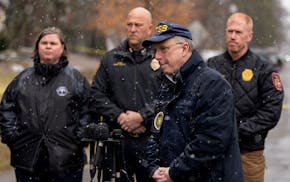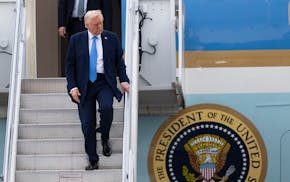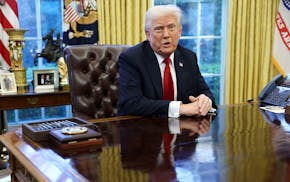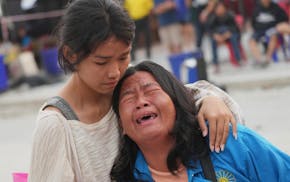DULUTH — The first in his family to attend college, the University of Minnesota Duluth's new chancellor is sympathetic to the difficulties in navigating financial aid.
Demystifying options to make college more affordable is high on Charles Nies' list of ideas to increase its enrollment of 9,400, one of the biggest challenges facing UMD's 10th leader.
Nies, 59, comes here from a city about the size of Duluth in central California. But he's a Minnesota native, from Hutchinson, and earned his undergraduate degree from the University of St. Thomas. Nies most recently served as vice chancellor for student affairs at the University of California, Merced. He replaces David McMillan, a former U regent who served in an interim role after Lendley Black retired.
Moving back to his home state played a role in his decision to join UMD, Nies said, but "there is a great story here to be told" in the university's commitment to undergraduate success.
The chance to amplify that is "something that I was really excited about being a part of," he said.
Nies hopes to strengthen partnerships with area schools so UMD can better meet workforce needs and keep more graduates in town. And, as a new resident who experienced the city's housing crunch firsthand, he will advocate for affordable housing for faculty and staff, he said.
Like universities across the nation, UMD continues to lose students. Enrollment has dropped by about 300 annually since 2018, and growth is certainly on Nies' agenda. He joins UMD already working through a process to streamline low-demand majors and courses to remain viable, after overcoming a $15 million deficit last year.
The Star Tribune sat down with Nies last week to talk about his vision. This interview has been edited for length and clarity.
Q. How do you view UMD's role within Duluth?
A. I've met with [city and school district officials] already, 30 days in. It's important that we take seriously our name — the University of Minnesota Duluth. It doesn't mean that we are located in Duluth, it means that we are part of Duluth. And that means a commitment, on my part anyway, of looking at and developing those relationships and those partnerships. Collaboration means that we have shared goals, and we are finding a way to combine those resources to advance those.
Q. What are your thoughts on a Large Lakes Observatory facility potentially built on Lot D, a proposed waterfront development?
A. Yesterday [July 31] was this freshwater symposium we did [on Lake Superior] — wonderfully supported by the community. There is keen interest in the work that has been done particularly out of the Large Lakes Observatory, looking at the role of fresh water. And if you attend any workshop that any of our faculty do in that space, you start to hyperventilate, recognizing the diminishing resource that is fresh water. And so the development of Lot D, while amazing and wonderful for the city, is also amazing and wonderful for the research that we would be able to do around fresh water that doesn't just impact Duluth. [It] could actually be addressing a world crisis. It is the opportunity for us to think about a new space where we can grow and expand some of the work that our faculty and students are currently doing around fresh water but also create that nexus that would bring in researchers from around the world.
Q. Your previous university was designated as R2, meaning it produces a high level of research. Do you have plans to move UMD, already producing a high level of research, in that direction?
A. Research, inquiry and discovery are clearly part of [UMD's] identity. And if R2 designation comes as part of that, then it comes as part of that. Clearly the research that is happening here is at the level of an R2 [measured partly through funding]. And the UMD spending on research is larger than all the other non-R1 public institutions in the region combined. But it isn't just for the sake of pursuing research. It has been done in connection with the community and it helps add value to the community to problem solve, and value for the undergraduate scholars who are able to participate.

U.S. Bancorp executive believed to be aboard plane that crashed into Brooklyn Park home

Trump says he's considering ways to serve a third term as president

Trump's promised 'Liberation Day' of tariffs is coming. Here's what it could mean for you

Trump roars down multiple paths of retribution as he vowed. Some targets yield while others fight

